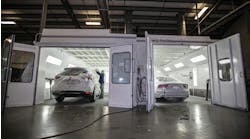An urgent phone call for thousands of dollars in automotive parts and equipment may seem too good to be true: that’s because it probably is.
Jobbers and parts distributors have become entangled in multiple cases of credit card fraud recently, and officials urge that caution and good sense be exercised when confronted with these unique orders.
The perpetrators have reportedly placed orders for next day delivery of such items as spark plugs and tires, with some requests exceeding $7,000, only to find out that the cards used are stolen.
At the time of the sale, the credit card used is verified and meets approval on the seller’s end, says Rodney Pierini, president and CEO of the California and Nevada Automotive Wholesalers’ Association (CAWA), which has received a number of complaints on the issue.
But by the time the seller gets wind that the card’s stolen — usually when the credit card company is contacted to secure a business address — the parts have already been shipped.
“A $7,000 sale going out the door hurts a jobber,” he adds.
After being alerted to the scam, CAWA notified the FBI and California District Attorney, as well as its own members.
Requests for large quantities of items, overnight or overseas delivery, willingness to get a different part based on availability and inquiries by fax, e-mail or phone relay service should all throw up red flags for the distributor, states CAWA.
Many jobbers and distributors do business with the same customers on a regular basis, says Pierini. And if orders seem exorbitant or unusual, it might be best to go to the authorities.
Requests for shipments of these fraudulent purchases are originating from California, Texas, Atlanta and as far away as Africa, among other locations, Pierini adds.
A Kansas-based company recently reported that an order for 1,500 spark plugs, more than this company sold in a year, was made twice in an attempt to be shipped to Nigeria.
Distributors should be skeptical of orders from other states or other countries for parts that are otherwise available locally, says Jonathan Cherry, spokesperson for the U.S. Secret Service, which investigates identity theft in concert with state and local agencies.
If a fraudulent order is suspected, CAWA advises contacting the credit card company to verify all information and holding the order for 24 hours to give the cardholder time to report the card stolen.
Dealerships targeted too
The credit card scam has reached into the dealership distribution channels as well.
Recent media reports state that OE distributors have detailed an increase of these auto parts scams over the past year, with some fraudulent orders totaling up to $100,000.
These same dealerships are taking such safeguards as not shipping the parts until the payment is in hand, requiring a faxed copy of a valid driver’s license along with credit card orders and making sure that the parts are being sent to the same address as that of the registered cardholder.
A Utah-based dealership contacted Aftermarket Business to report that they were able to report four stolen cards to the credit card companies, and when orders were placed using these cards, the distributor sent a shipment of bin dividers instead of the automotive parts requested.



